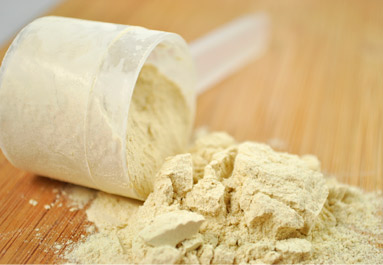No one knows better than a vegan athlete how prominent the issue of dietary protein is in most peoples' minds. Ask any vegan athlete what question they hear most, and it will undoubtedly be "Where do you get your protein?" And this isn't too surprising. The fitness industry, especially its bodybuilding aspect, has long touted the importance of a high protein diet for muscle gains, and most people outside the vegan community are clueless that plants, not animals, are the ones producing protein in the first place. Regardless of where you get your protein, several studies conducted within the last decade have pointed to protein, and specifically to the amino acid leucine, as a driver of muscle-building protein synthesis, and since animal proteins tend to have a higher concentration of leucine than plant proteins, it makes sense that vegan athletes will generally need to consume more total protein to achieve the same muscle-boosting effect from their diet that omnivores observe. This effect is separate from a discussion of any training that will induce muscle growth independent of diet, and of course is not addressing the countless advantages of a plant-based diet, such as improved performance and recovery, reduced metabolic acid load, increased micronutrient intake, and countless other topics where a plant-based diet handily trounces an animal-based one — such as longevity.

A multitude of research dating back to the 1930s has shown that caloric restriction (reducing daily caloric intake by ~30%) can extend the lifespan of a wide range of species from insects to primates, and quite possibly humans as well. A new study published last year in the prestigious journal Nature pointed to one reason caloric restriction might work: reduced leucine intake. That's right, it's possible that the exact same biochemical process that leucine stimulates to generate new muscle mass is also responsible for accelerating the aging process. And this makes sense when given some thought. Faster growth rates and larger body sizes tend to correlate with shorter life spans in many animals (including humans), and it may explain why the longest lived populations on earth all happen to eat a low protein, mostly plant-based diet. There is certainly a lot more research to be done before any of this information can be stated with certainty, but for now we have one more reason a vegan diet may be superior to an omnivorous one, and a reason to think twice before deciding to follow a high protein diet or supplement with leucine.
SC Johnson, PS Rabinovitch, M Kaeberlein. mTOR is a key modulator of ageing and age-related disease. Nature. 2013 493(7432):338 - 345.
http://www.ncbi.nlm.nih.gov/pubmed/23325216
L Yan, R. F. Lamb. Amino acid sensing and regulation of mTORC1. Semin Cell Dev Biol. 2012 23(6):621 - 625.
http://www.ncbi.nlm.nih.gov/pubmed/22342805



Recommended Comments
There are no comments to display.